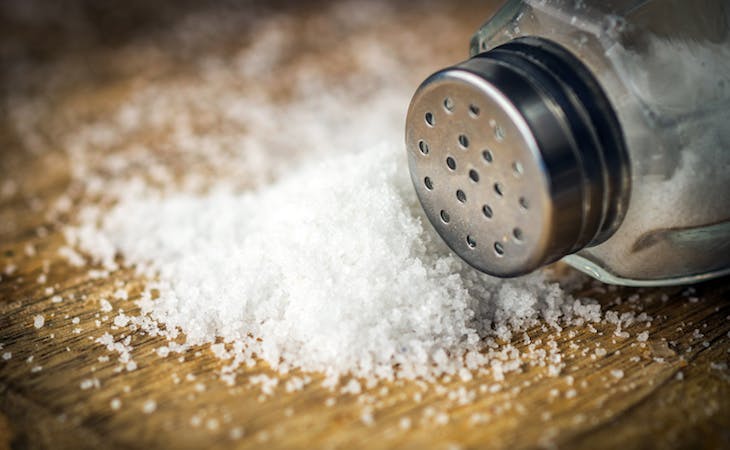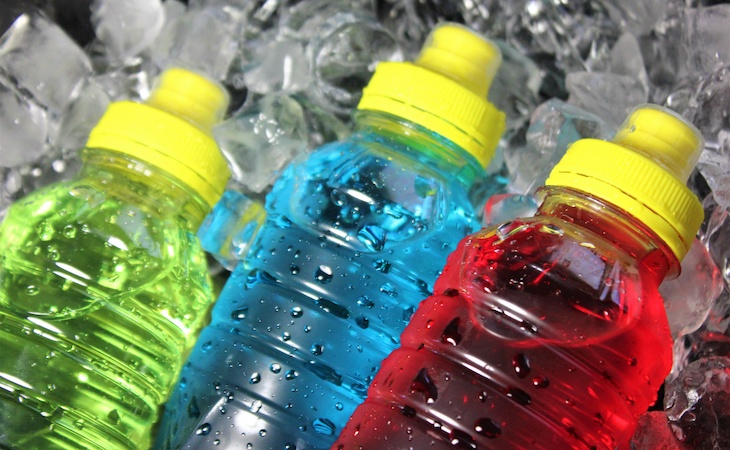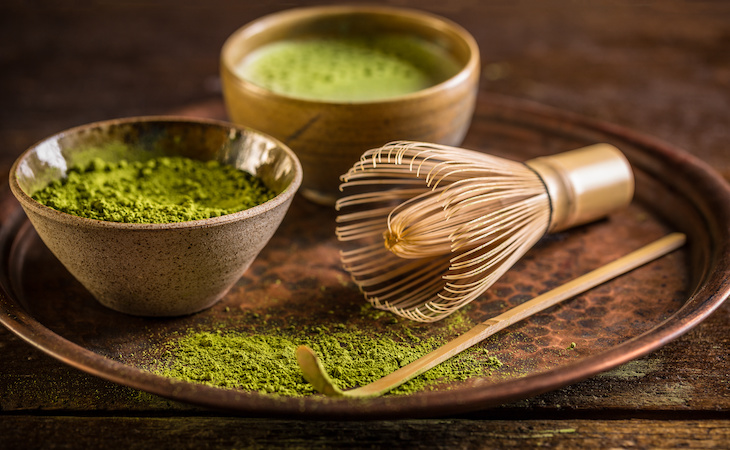We all know sugar can mess with our sleep in a host of ways. But it turns out salt can also keep us from getting the quality shuteye we need to function at our best.
We need salt because it’s the primary source of the sodium our body needs to keep fluids and blood pressure in balance and for the proper functioning of muscles and nerves. [14] But our bodies only require about 500 mg of salt per day. [4]
Most of us get far more than that, particularly if we eat processed foods. The American Heart Association (AHA) recommends consuming no more than 2,300 mg—slightly less than half a teaspoon—per day, ideally less than 1,500 mg per day. [4] However, according to the AHA, most Americans eat more than 3,400 mg of salt a day. [4]
You most likely have heard that too much salt can give you high blood pressure and heart disease, the number one killer in the United States. [1, 8] But chances are you didn’t know—unless you’ve experienced it—that salt can also disrupt your sleep. [2]
How does salt affect your sleep?
“One of the main reasons why excessive sodium intake can cause sleep issues is linked to water retention,” [6, 10] says Alex Savy, certified sleep science coach and founder of SleepingOcean.com.
Salt draws water in and keeps it lingering in the body more than it’s needed, he explains. When you lie down, that water starts redistributing and often ends up near the upper airways. This can cause obstructed air circulation and lead to aggravated sleep apnea in those already prone to it. [6, 10]
One study reported in Endocrine Abstracts makes it clear how else salt affects sleep. Over six days, the researcher studied 20 volunteer students who had no sleep problems beforehand. They recorded the students’ sleep time and when they went to bed for the first five days. [11]
On the sixth day, each student took half a gram of salt per 10 kg (about 22 pounds) of body weight at 8 p.m. The researcher then recorded their sleep time, number of awakenings during the night, any other disturbances while they were asleep, sleep duration, how many times they drank water during the night, their general condition after sleep, the effect on REM sleep, and nightmares in non-REM sleep. [11]
The study found that salt delayed the students’ time to go to bed and caused them to awaken several times during the night—disturbing about two to three hours of sleep. Their deep sleep decreased. There was less non-REM sleep and more REM sleep than usual, including a lot of dreaming and sometimes nightmares. The students woke up earlier and repeatedly got up during the night for water. The day after, they felt drowsy and fatigued. [11]
“Chips, nuts, and other foods normally contain lots of sodium (5%-10%),” the researcher concludes at the end of the study. “Each 100 grams introduces 4-6 grams of salt to the body. Taking these especially in the evenings can disrupt sleep. Thus it is recommended people with sleep problems must not take these in the last hours of the day.” [11]
Notice how the researcher uses the words take these—as though the salt they contain were a drug. In fact, that’s how it affects us.
What salt does to your health
“Consuming higher amounts of sodium increases the risk of high blood pressure that is very likely to interfere with your sleep,” says Clara Lawson, RDN with USAHemp and expert in personalized nutrition and dietary plans. “It may not cause problems for healthy people, but those with high blood pressure should refrain from eating foods with high sodium levels to avoid sleep disruptions.”
Consuming too much salt causes your body to retain fluids in higher amounts, Lawson explains. “Retaining a lot of fluids fills up your bladder due to which you are more likely to wake up in the middle of the night for urination,” she says. [2]
How to keep salt from ruining your sleep
Simply becoming more aware of the salt in your diet is a big step toward controlling it. The majority of your daily salt comes from processed and prepared foods, says Lawson. It is therefore highly advised to check labels before you buy any product and avoid the ones that have high sodium content. [12]
Mary Wirtz, RDN with MomLovesBest.com, offers practical suggestions for reducing salt in your diet while enjoying the foods you love. “Fortunately you can still have flavor without having to over-rely on salt,” she says. “Fresh and dried herbs, lemon and lime juice, vinegar, peppers, among many other strategies, are fantastic alternatives.” [3]
Wirtz adds that one of her favorite recipes is homemade pico de gallo with fresh Roma tomatoes, chopped onion and jalapenos, fresh cilantro, and a squeeze of lime juice.
The bottom line, says Wirtz, is this: If you want to reduce your overall salt intake, scrutinize where you think a majority of your salt intake is coming from and opt for better alternatives.
So next time a slice of pizza calls your name inside the three hours before bedtime, remember that only one slice of cheese pizza can contain between 370-730 mg of sodium. [1] That’s before you heap on the toppings. A couple of slices can blow your whole day’s recommended total.
The bottom line: By getting control of your salt intake, you can lower your risk of heart disease and increase your sleep quality. [1, 2, 11, 13]
Which foods can help you snooze better? Here are the best late-night snacks to nosh on if you get hungry before bed.
References
- Sodium | cdc.gov. Centers for Disease Control and Prevention. https://www.cdc.gov/heartdisease/sodium.htm#:~:text=The%20body%20needs%20a%20small,for%20heart%20disease%20and%20stroke.&text=Most%20of%20the%20sodium%20we%20consume%20is%20in%20the%20form%20of%20salt. Published December 21, 2021.
- Jung JY, Oh CM, Kim E, Park SK. Dietary sodium intake and its relation to sleep duration, sleep quality and nocturnal urination in working-aged Korean adults [published online ahead of print, 2023 Jul 17]. Nutr Bull. 2023;10.1111/nbu.12629. doi:10.1111/nbu.12629
- American Heart Association. Shaking the salt habit to lower high blood pressure. www.heart.org. https://www.heart.org/en/health-topics/high-blood-pressure/changes-you-can-make-to-manage-high-blood-pressure/shaking-the-salt-habit-to-lower-high-blood-pressure. Published June 1, 2023.
- American Heart Association. How much sodium should I eat per day? www.heart.org. https://www.heart.org/en/healthy-living/healthy-eating/eat-smart/sodium/how-much-sodium-should-i-eat-per-day. Published May 10, 2023.
- Pimenta E, Stowasser M, Gordon RD, et al. Increased dietary sodium is related to severity of obstructive sleep apnea in patients with resistant hypertension and hyperaldosteronism. Chest. 2013;143(4):978-983. doi:10.1378/chest.12-0802
- Kasai T, Peker Y. To Salt or Not to Salt? Is That a Question in Obstructive Sleep Apnea?. Ann Am Thorac Soc. 2021;18(3):424-425. doi:10.1513/AnnalsATS.202011-1458ED
- Giatti S, Santos RB, Aielo AN, et al. Association of Sodium with Obstructive Sleep Apnea. The ELSA-Brasil Study. Ann Am Thorac Soc. 2021;18(3):502-510. doi:10.1513/AnnalsATS.202005-498OC
- Heart Disease Facts | cdc.gov. Centers for Disease Control and Prevention. https://www.cdc.gov/heartdisease/facts.htm#:~:text=Heart%20disease%20is%20the%20leading,groups%20in%20the%20United%20States.&text=One%20person%20dies%20every%2033,United%20States%20from%20cardiovascular%20disease. Published May 15, 2023.
- Li T, Song L, Li G, et al. Eating habit of adding salt to foods and incident sleep apnea: a prospective cohort study. Respir Res. 2023;24(1):5. Published 2023 Jan 7. doi:10.1186/s12931-022-02300-6
- Kasai T. Fluid Retention and Rostral Fluid Shift in Sleep-Disordered Breathing. Curr Hypertens Rev. 2016;12(1):32-42. doi:10.2174/1573402112666160114093550
- Heydarpour, F The effect of salt on night sleep. Presented at the 8th European Congress of Endocrinology incorporating the British Endocrine Societies. Endocrine Abstracts 11 P590.
- American Heart Association. How to track your sodium. www.heart.org. https://www.heart.org/en/healthy-living/healthy-eating/eat-smart/sodium/how-to-track-your-sodium. Published May 10, 2023.
- Mossavar-Rahmani Y, Weng J, Wang R, et al. Actigraphic sleep measures and diet quality in the Hispanic Community Health Study/Study of Latinos Sueño ancillary study. J Sleep Res. 2017;26(6):739-746. doi:10.1111/jsr.12513
- Strazzullo P, Leclercq C. Sodium. Adv Nutr. 2014;5(2):188-190. Published 2014 Mar 1. doi:10.3945/an.113.005215




